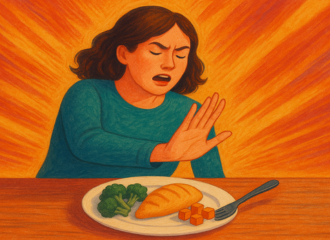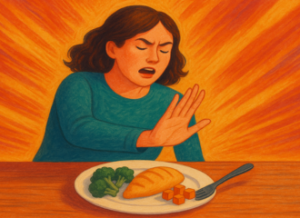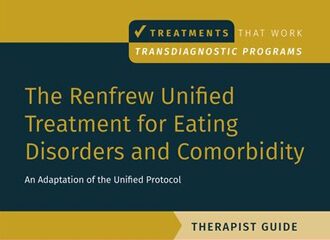Written By: Diana Valenzuela
Published by: Katie Couric Media
I have a babbling baby who currently loves to eat nearly anything. (Watching her smear avocado onto her nine-month-old face is a genuine evening highlight.) But since I’m a contemporary parent with access to a phone, I’m also constantly in online parenting forums that claim to know what’s right around the corner for her: extreme pickiness around food. I’m constantly dreading that moment when she declares that she won’t eat broccoli — or any green vegetable at all. I’ve seen parents on Reddit and Discord write lengthy paragraphs lamenting their child’s total dependence on crackers and milk as their sole sources of nutrition. It’s a phase to be dreaded.
And yet, parents battling this version of food aversions seem to be the “lucky” ones: There’s also a segment of parents currently dealing with an even more extreme version of food fussiness, called Avoidant/Restrictive Food Intake Disorder. According to the missives sent out onto the web, this is nuclear pickiness — like a kid insisting that they will only consume four or five, usually beige, foods.
Officially added to the DSM-IV in 2013, ARFID means severely restricting the amount and/or type of food you eat. Skeptics may say this is just ultra-pickiness but stressed parents hotly disagree. Many say that their kids with ARFID appear to fear certain foods and throw tantrums when they’re served something like pesto. Other children eat so little, they may verge on starving themselves; some may even have developmental disorders like delayed puberty because of nutritional deficiencies. Experts agree, this isn’t fussiness, it’s an eating disorder.
And if you don’t have a child in your life, this still may be relevant to you. Reaching adulthood doesn’t mean you’ve aged out of ARFID; adults can be diagnosed with it. One study of about 50,000 adults found that 4.7 percent of respondents screened positive. And these aren’t necessarily people whose childhood food anxieties have lasted a lifetime; you can also develop ARFID later in life.
Are parents of ARFID-affected kids just pushovers who need to put their feet down? Do the adults who are suffering from these aversions just need to get over themselves? And why, 10 years after being added to psychiatric nomenclature, is this “new” eating disorder still so hard to understand? To dig into the facts, we spoke with Rachel Kramer, Ph.D., a clinical psychologist at the University of California, San Francisco, to learn about how to treat people who suffer from the disorder. We also consulted Jaclyn Macchione, an occupational therapist at The Renfrew Center, an eating disorder treatment program, who explained her radical approach to treating patients of all ages.
What is ARFID?
ARFID, per the Cleveland Clinic, is “a condition that limits your food intake.” Unlike more commonly diagnosed eating disorders, “it isn’t caused by a negative self-image or a desire to change your body weight.” Instead, “fear and anxiety about food or the consequences of eating, like choking, can lead to ARFID.” Similarly, fear of vomiting, food allergies, or fear of possible GI distress can fuel the disorder.
You may look at this criteria and say it appears to be learned behavior that doesn’t constitute a huge problem; after all, the negative self-image that’s a hallmark of disorders like anorexia nervosa isn’t at play. But according to Macchione and Dr. Kramer, the severity of ARFID can lead to nutritional deficiencies, growth issues, and problems socializing (since parties and celebrations always revolve, in part, around food).
Aside from very real physical and social ramifications, the anxiety can be so extreme that it becomes all-encompassing. Macchione says, “A kid [with] a peanut allergy, [could] over time start generalizing their fear.” She explains they might express concerns around eating any other type of nut, anything the same color as peanuts, or items in the peanut butter aisle of the grocery store.
Read the full article here.




